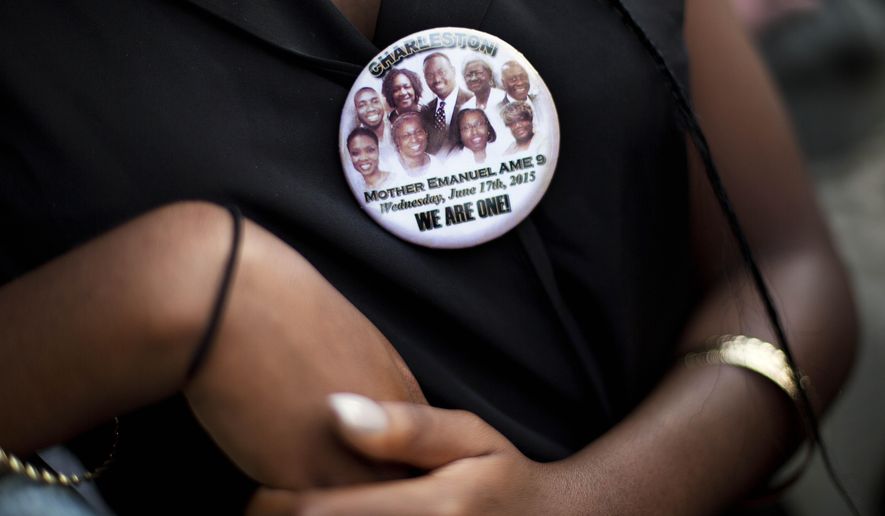ANALYSIS/OPINION
Late last month, pure evil visited the Emanuel African Methodist Episcopal Church in Charleston, South Carolina. It came in the form of a deranged, racist gunman who attended Bible study among the welcoming members of the church before pulling a weapon and cruelly cutting them down.
By the end of last week, nine innocent souls had been laid to rest in a string of funerals celebrating the lives that they lived. But while many congregants have already forgiven the perpetrator of this carnage and prayed for him, I am just not there.
My cousin, the Rev. Clementa Pinckney, was among the victims. He was my kin, he was the real deal, and he is gone too soon from this world. Clementa’s parents and mine lived just across the field from one another in the town of Marion, South Carolina, and our families have been close for decades.
Clementa was called to preach at the age of 13, and by 18 he was already a pastor. After college he served as an intern for a member of the South Carolina House of Representatives. When she retired, Clementa successfully ran for her seat, becoming the youngest person ever elected to serve in the House at just 23 years of age. By 27 he had won election to the state senate — another unprecedented achievement.
Despite his commitments as a full-time pastor, a father and husband, Clementa made time to earn two master’s degrees. At 41 he was beginning to enjoy all that his hard work and dedication had earned him — and then it was all taken away. And of all places, it was stolen right there in his beloved church, surrounded by friends and loved ones from his community.
I was struck recently when I heard that many members of the church have already forgiven the sick young man who spilled blood inside God’s house. In fact, a number of the congregants who had not yet forgiven the shooter expressed their disappointment with themselves for not yet finding that feeling in their hearts. It’s hard to imagine: experiencing violent tragedy, and just one week later living Jesus’ teaching to love your enemies and pray for those who persecute you.
As I look inward and reflect upon the shooting, I encounter a turbulent, swirling storm of emotions. I feel pain for the victims and their families, but neither compassion nor love for the man who decided to turn murderously on those who welcomed him with open arms.
The shooter has reportedly told police that he nearly changed his mind about shooting my cousin and the other congregants because they were so nice — but he didn’t. He took full credit for his actions. He is proud of what he did. And he has neither expressed remorse nor asked for forgiveness.
So is forgiveness something that should be offered to him? Do our Jewish brothers and sisters, who worship the same God, feel bound by that same obligation? Isn’t the Jewish concept of granting forgiveness required only for those who admit their wrongdoing and ask for forgiveness? The Jewish people’s rich history includes many remembrances of past tragedy. But have they forgiven Adolf Hitler and the legions of other tyrants who have tried to annihilate their people through the centuries?
If many of those who were in church that fateful day have already found it in their hearts to forgive this man, if not his evil act, then why can’t I? I do not know, and probably never will. It sounds harsh to admit it, but I want him gone, I want him executed for his crimes. I want him held to account for murdering innocents and required to pay that same ultimate price himself.
But even were that to happen, I am not certain that his departure from the earth would bring closure for me. Some of my faith in humanity, and hope for the future, died in that church in South Carolina.
Yet I know that, as a person of faith who hails from the Charleston community, I have a responsibility to continue the work that was done by Clementa. In time the wounds will heal, and it would be self-defeating to allow the evil that crept into Emanuel AME Church to infect my own heart.
At the same time, all Americans must strive to create a greater society. Evil is not merely an abstraction, something that we read about in the Bible, but it does actually exist in this world. Hate crimes are not just about the races of the people who perpetuate violence upon one another, but, at their core, they are actually acts of hatred against humanity itself.
At a time of increasing division in this nation, men and women from all backgrounds must strive to show great understanding, compassion, respect and tolerance.
These times call for courage. Let all of us come together and honor the lives of those brave and innocent souls who were called to God. Let us put on the armor of the Lord and move forward as one nation, indivisible, upholding the banner of liberty and justice for all.
• Armstrong Williams is sole owner/manager of Howard Stirk Holdings and executive editor of American CurrentSee online magazine.
• Armstrong Williams can be reached at 125939@example.com.




Please read our comment policy before commenting.